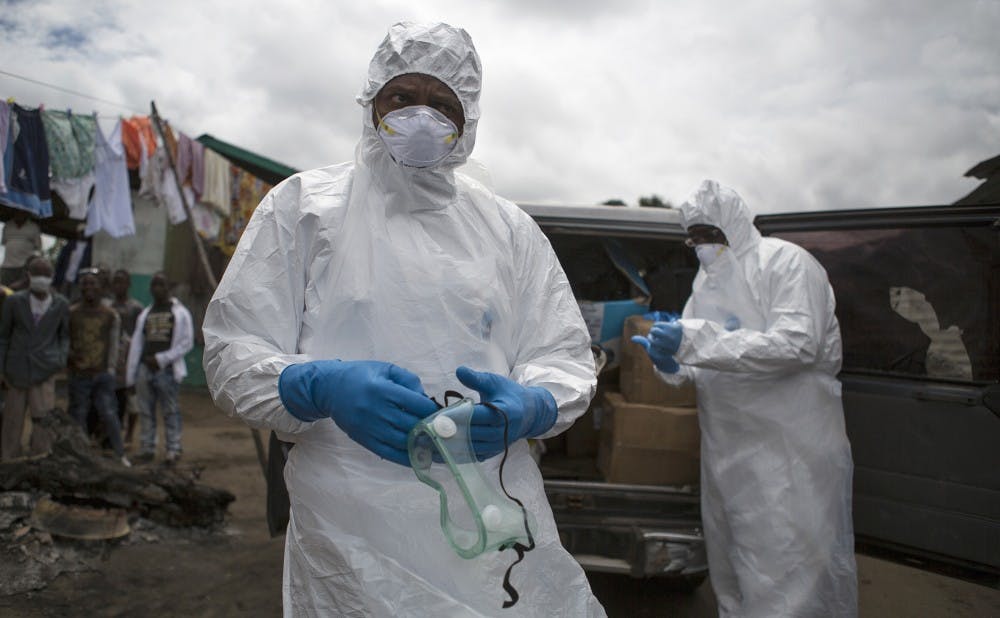“Duke is in a good position in terms of local resources, local expertise and in-hospital management capacity,” Dr. Cameron Wolfe said of the possibility of an Ebola outbreak.
Should a local case appear, Duke would be a fortuitous place to encounter the virus because it has one of the nation’s best infection control programs, said Wolfe—an assistant professor of medicine in the infectious diseases department.
Wolfe, director of biopreparedness for Duke Preparedness and Response Center, was one of several Duke experts that hosted a panel Wednesday to discuss the steps and procedures that the University and the Duke Health System are taking to prepare for a case of ebola. The infection control program includes a collaboration between the Preparedness and Response Center and the Occupational and Environmental Safety Office to coordinate safety procedures across all Duke departments.
“This is obviously an illness that has an unique history of causing healthcare workers to fall sick,” Wolfe said. “The preparation that is different is that you need to not only have a more intensive form of personal protective equipment, but you also need to [make sure] the patients [don't] have unnecessary people coming in to visit them…[the visitors] might put themselves at risk.”
The ability of Duke hospitals to hold specific isolation areas for infected patients is especially important, Wolfe said.
Distinct characteristics of the Ebola virus has required changes in protocols and regulations by the the health system—some significantly different from those used to handle past diseases.
Should the University neglect the safety protocol it has in place, the results could be disastrous, Wolfe noted.
“If you take a pessimistic look at this, say we don’t do anything about it, we are looking at more than 1.4 million people infected by mid-January,” he said.
Wolf noted that the protocol for using personal protective equipment, or PPE, is different from that of almost any other routine infections in the past. Because the PPE used for handling Ebola is very easy to put on but extremely difficult to take off without exposing the health worker to the virus, additional staff training is required.
The new screening protocol places greater emphasis on the timeliness of response than those in the past.
"We don’t usually get into the habit of asking travel history at the very beginning of the evaluation of someone," Wolfe said. "By sort of flipping on its head of how we take history, we will be able to identify patients from early on, and that’s a big deal."
According to the presentation by Wolfe, the current protocol for screening incoming patients to Duke Medicine includes three key questions: “Have you traveled outside the US in the last 21 days?”; “Have you specifically travelled to Guinea, Liberia or Sierra Leone?”; and “Do you have any symptoms, and if so, what?” The patients whose answers are positive for all three of these questions will be placed in isolation, while Duke Medicine notifies Infection Control.
"Traditionally, when a patient is sent to the emergency room, you get a very long and detailed examination of history, where travel history will be a part of it," Wolfe said. "[In the case of Ebola], if the travel history and the risk of infection of a patient are not identified at the very beginning, you might have unnecessarily put someone through half an hour to two hours worth of unnecessary risk that we could have averted by simply asking those three questions."
Nigeria—previously an Ebola-affected country but currently not included in the travel history questions—was declared Ebola-free Oct. 21 after a six-week period without any emergence of new cases. Wolfe added that the quickness in response, isolation and monitoring of infected patients and public awareness resulted in the success of Ebola containment in countries like Nigeria and Senegal.
“[These examples] tell us that if we do it right, we can get people out of the situation,” he said.
Get The Chronicle straight to your inbox
Signup for our weekly newsletter. Cancel at any time.

